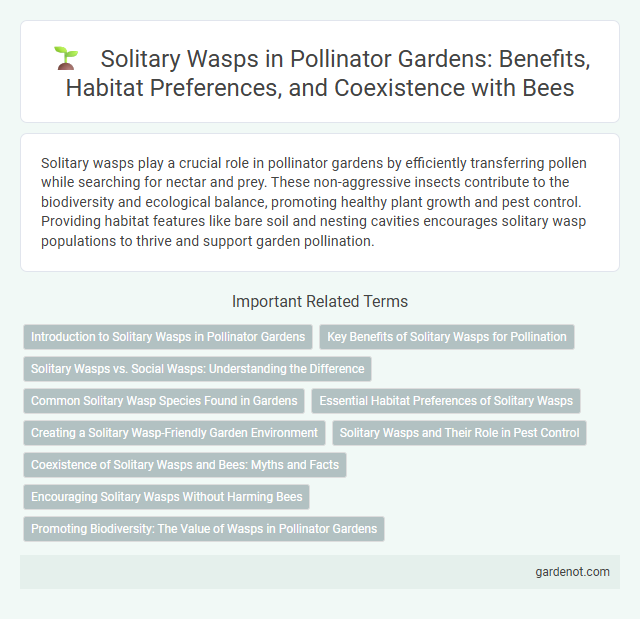Solitary wasps play a crucial role in pollinator gardens by efficiently transferring pollen while searching for nectar and prey. These non-aggressive insects contribute to the biodiversity and ecological balance, promoting healthy plant growth and pest control. Providing habitat features like bare soil and nesting cavities encourages solitary wasp populations to thrive and support garden pollination.
Introduction to Solitary Wasps in Pollinator Gardens
Solitary wasps are vital pollinators in garden ecosystems, contributing to the pollination of diverse flowering plants without forming large colonies. These wasps typically nest in isolated tunnels or natural cavities, enhancing soil aeration and pest control by preying on garden pests. Their presence in pollinator gardens supports biodiversity and promotes a balanced, healthy environment for other beneficial insects.
Key Benefits of Solitary Wasps for Pollination
Solitary wasps contribute to pollination by efficiently transferring pollen as they forage for nectar, supporting plant reproduction and biodiversity. Their stealthy and non-aggressive nature encourages coexistence with other pollinators, enhancing garden ecosystem stability. These wasps also help control pest populations, reducing the need for chemical pesticides and promoting healthier plant growth.
Solitary Wasps vs. Social Wasps: Understanding the Difference
Solitary wasps are distinct from social wasps as they do not live in colonies and each female independently builds nests and cares for her offspring. Unlike social wasps that form large, cooperative hives, solitary wasps play a crucial role in pollinator gardens by controlling pest populations without aggressive defense behaviors. Understanding these differences highlights solitary wasps' benefits in maintaining garden health and supporting biodiversity.
Common Solitary Wasp Species Found in Gardens
Common solitary wasp species found in gardens include the mud dauber wasp (Sceliphron caementarium), known for building tube-shaped mud nests, and the cicada killer wasp (Sphecius speciosus), which preys on cicadas. These solitary wasps contribute to natural pest control by hunting various garden insects, making them vital pollinators and beneficial garden inhabitants. Their nesting habits, often in soil or wooden cavities, also support biodiversity and ecological balance within pollinator gardens.
Essential Habitat Preferences of Solitary Wasps
Solitary wasps prefer habitats with abundant flowering plants that provide nectar and pollen as essential food sources. They require bare or sandy soil patches for nesting, where they dig burrows to lay eggs and provision prey. Proximity to aphid-rich vegetation is crucial for hunting, supporting their role as natural pest controllers in pollinator gardens.
Creating a Solitary Wasp-Friendly Garden Environment
Creating a solitary wasp-friendly garden environment involves planting native wildflowers and providing bare soil patches for nesting, as these wasps prefer undisturbed ground. Incorporating diverse flowering plants that bloom sequentially throughout the season ensures a continuous food supply, supporting solitary wasps' role in natural pest control. Avoiding pesticides and providing sheltered areas like hollow stems or wood cavities further enhances habitat suitability for solitary wasps in pollinator gardens.
Solitary Wasps and Their Role in Pest Control
Solitary wasps play a crucial role in natural pest control within pollinator gardens by preying on or parasitizing harmful insect pests such as aphids, caterpillars, and beetle larvae. These wasps lay their eggs in or on pest hosts, reducing pest populations without the use of chemical pesticides. Promoting solitary wasp habitats enhances garden health and biodiversity through effective biological pest suppression.
Coexistence of Solitary Wasps and Bees: Myths and Facts
Solitary wasps and bees coexist in pollinator gardens by occupying different ecological niches, reducing direct competition for resources. Solitary wasps primarily prey on other insects to provision their nests, while solitary bees focus on collecting pollen and nectar for their offspring. Dispelling myths about solitary wasps being aggressive, most species are non-aggressive toward humans and play complementary roles in maintaining garden biodiversity.
Encouraging Solitary Wasps Without Harming Bees
Solitary wasps play a crucial role in pollinator gardens by controlling pest populations without competing aggressively with bees for resources. Encouraging solitary wasps involves providing suitable nesting habitats like bare soil patches, hollow stems, and undisturbed wood, which support their solitary nesting behavior. Avoiding broad-spectrum pesticides and planting a diverse array of native flowering plants ensures the protection of bees while promoting solitary wasp activity.
Promoting Biodiversity: The Value of Wasps in Pollinator Gardens
Solitary wasps play a crucial role in promoting biodiversity within pollinator gardens by controlling pest populations, which supports the health of flowering plants. Their predation on harmful insects reduces the need for chemical pesticides, enhancing the natural ecosystem balance. Integrating solitary wasps into pollinator gardens enriches species diversity and fosters a resilient environment conducive to thriving plant and animal life.
Solitary wasp Infographic

 gardenot.com
gardenot.com